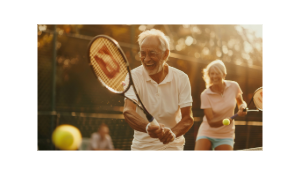
While summer brings us warmth, clear skies and an opportunity to get out and about more, prolonged exposure to excessive heat during these months can be dangerous. This can be especially true for older adults.
Older adults and individuals with chronic medical conditions can be at high risk for developing heat related illnesses due to age related changes to the body, the effects of taking some medications, and age related changes to their bodies. It is estimated that more than 600 Americans die every summer due to health problems caused by heat and humidity.
Staying Safe When It Is Hot Out:
- Stay away from direct sunlight/exposure as much as possible. If you can, plan your outdoor activities earlier in the morning or when the sun is starting to set.
- If you must be outside, wear sunscreen. Use a broad spectrum sunscreen lotion or spray with a sun protection factor (SPF) of 15 or higher. Apply sunscreen liberally to all exposed skin. If possible, go with a lotion sunscreen over a spray. Sprays tend to go everywhere, with much of it hitting the air, while with a lotion, you can almost guarantee good coverage every time.
- Stay hydrated. Drink plenty of cold water, clear juices, or other caffeine/alcohol free drinks.
- Wear loose fitting, light colored clothing when possible. Try to avoid wearing dark colors as they can be heat absorbing. Wearing a lightweight, broad brimmed hat can be wise, as it will help you both stay cool, and avoid a sunburn.
- Take tepid baths, showers, or even sponge baths if you find yourself feeling too hot. If you don’t have time for that, it is suggested to try applying a wet washcloth with cool water to your wrists, ankles, neck or armpits.
- Air Conditioning. Spend as much time as possible in air-conditioned spaces. If you do not have air conditioning, it is recommended that you go somewhere that has it. For example, take a walk in an indoor mall, browse and read a book at the library, go see a matinee at the local movie theatre, or meet your friends (or make some new ones!) at the local senior center.
NOTE: The Federal Low Income Home Energy Assistance Program (LIHEAP) helps adults age 65 and older, who have limited incomes cover the cost of air conditioners and utility bills. To reach your states LIHEAP program, call 1-866-674-6327.
How to Spot and Treat Heat Related Health Problems:
Dehydration: Loss of water in your body that can become serious if not treated.
Warning Signs: Weakness, headache, muscle cramps, confusion, dizziness, passing out.
What to do: Drink plenty of water, or if possible, drinks that have electrolytes. Electrolytes play a key role in regulating your heartbeat. Your body loses electrolytes when you’re dehydrated. If you do not feel better, call 911. If you are feeling dehydrated and have medical conditions like heart failure or if you take diuretics (water pills), you should call your healthcare provider because you may need to be seen by a professional.
Heat Syncope: Fainting caused by high temperatures
Warning Signs: Dizziness or fainting
What To Do: Lie down and put your feet up. Drink plenty of water and other cool fluids.
Heat Exhaustion: A serious health condition caused by too much heat and dehydration. If not treated it could lead to heath stroke (see below)
Warning Signs: Heavy sweating or no sweating, muscle cramps, tiredness, weakness, paleness, cold or clammy skin, dizziness, headache, nausea or vomiting, fast or weak pulse, fainting. Body temperature is generally between 98.6° F and 104° F.
What To Do: Quickly move to a cool, shaded spot and drink plenty of cool fluids, such as water or sports drinks. Call 911 at once if you have high blood pressure or heart problems, or if you do not feel better quickly after trying to cool down.
Heat Stroke: A very dangerous rise in body temperature, which could happen gradually over days of heat exposure in older adults. It can be deadly.
Warning Signs: A body temperature of 104° F or higher, dry, hot, red skin, headache, fast pulse, nausea or vomiting, dizziness, confusion or lethargy, passing out
What To Do: Call 911 at once! Move to a cool, shady spot, and loosen or remove any heavy clothing. If possible, douse yourself with cool water on your wrists, ankles, armpits and neck to try to lower your body temperature. Try to see if you can safely swallow water or a sports drink while waiting for help to arrive.
.png?width=300&height=105&name=Trusted%20Senior%20Stack%20(1).png)


.png?width=160&height=90&name=cdn%20(1).png)